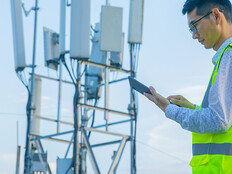4G vs. 5G Download/Upload Speeds For Smart Cities
As government IT leaders eye smart city projects, the download and upload speeds they will need to make these dreams come true are likely on the horizon. This faster connectivity is thanks to the advent of the fifth-generation mobile network, which promises to offer high-speed, low-latency services.
The 5G network is built with Internet of Things devices in mind, with the ability to connect everything from smart parking meters to intelligent streetlights and beyond in the areas where it’s available.
“The 2G networks were designed for voice, 3G for voice and data, and 4G for broadband internet experiences. With 5G, we’ll see computing capabilities getting fused with communications everywhere, so trillions of things like wearable devices don’t have to worry about computing power because [the] network can do any processing needed,” Asha Keddy, general manager for standards and advanced tech in Intel’s mobile communication group, tells Quartz.
The networks will do this effectively by using separate planes on top of and underneath the network to keep much of the location and sensing data close at hand, while saving energy.
“There will be an underlay network with computing and communications, so not everything needs to go through backhaul because lots of capabilities will be available close to where it’s needed,” Keddy tells Quartz.
SIGN UP: Get more news from the StateTech newsletter in your inbox every two weeks
The Difference Between 4G and 5G Download and Upload Speeds
Download and upload speeds will certainly improve with the advent of 5G, but by how much?
According to Smart Cities Dive, 4G LTE networks have download speeds of 5-12Mbps and upload speeds of 2-5Mbps. Download speeds for 4G LTE peak at around 50Mbps.
While speeds are still conceptual, initial reports indicate that 5G networks could be nearly 100 times faster than 4G LTE, with download speeds of up to 10Gbps, according to performance reports from the 2018 Winter Olympics in Pyeongchang.
Meanwhile, a recent simulation of 5G browsing speeds by Qualcomm found that, in a San Francisco test, "browsing speeds went up from 71 Mbps for the median 4G user to 1.4 Gbps for the median 5G user," representing a 23-fold increase, The Verge reports.
What Will Faster Speeds Mean for Smart Cities?
The cities, counties and states where 5G networks do take hold will have a strong basis for connected deployments. Verizon laid out plans last year to test the technology in 11 U.S. cities. Along with these tests will come the proving ground for IoT.
“It really is, we call it, the era of machines,” Sandra Rivera, Intel Corp.’s senior vice president overseeing network platforms, tells Business Standard. “Machines are coming, and the 5G is a big enabler with that true convergence of computing and communications.”
Autonomous vehicle communications may stand to benefit the most. 5G could offer driverless cars the infrastructure necessary to communicate with each other as well as with intelligent traffic control systems.
“I think [5G is] a major stepping stone to making vehicles fully autonomous,” Samir Saini, CIO for New York City (formerly CIO of Atlanta), told StateTech in a January article.
Challenges Ahead for 5G Infrastructure
The faster download and upload speeds are the result of new architectures, which means taller towers that can prove to be problematic when it comes to zoning issues.
“5G will require many more antennas, and those antennas have to be hooked up to power and the rest of the Internet,” Doug Brake, director of telecommunications policy at the Information Technology and Innovation Foundation (ITIF), tells Government Technology. “Building out all the 5G equipment and connectivity will have to be a cooperative endeavor with local governments if it is to truly flourish.”









